
In deciding when to stay in Chiang Mai, whether for a holiday or for long stay, you first have to change your perception of what you think is important for the climate that you want to live in. If you come from a moderate climate, you're most likely biased to think that no rain, dry and sunny weather is the best. It's the rain and the clouds back in the UK that you're bored of and you're dreaming of sunny beaches with clear skies.
In Thailand, all these climatic factors work differently. The rain is not a mood waster as children's songs would suggest (rain-rain-go-away), but it's a guarantee for cleaner air. There is pollution all year round in Thailand in every city and province, whether it's from inferior fuel, poorly maintained exhaust pipes, industry, burning or whatever. The only thing that can clean the air are rain and wind.
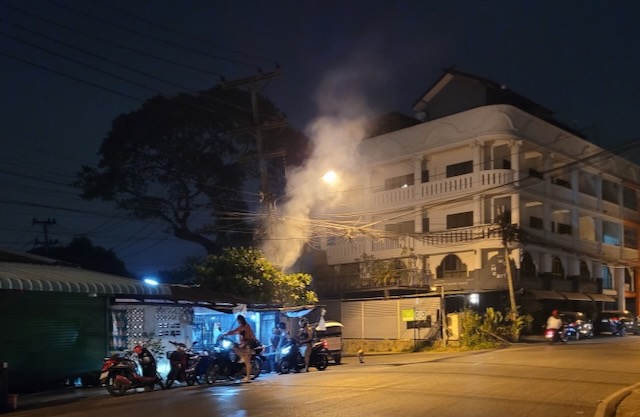
There is always air pollution in Chiang Mai all year round, whether it is from traffic, cooking, somebody burning waste or anything else.
The sun is the other 'enemy': there is too much of it and you'll have a hard time finding a Thai person who exposes him/herself to sun all the time. Most Thai people know the sun is something to hide for, to sit in the shadow or to completely cover yourself up with head masks and long sleeves.
IN THAILAND, THE REAL 'ENEMIES' OF THE WEATHER ARE NOT RAIN AND CLOUDS BUT SUN AND POLLUTION
One of the main reasons to visit or live in Chiang Mai is the weather: generally cooler than in Bangkok and the south of Thailand, and of course much warmer than Northwest Europe, North America and most of China.
Chiang Mai and the North of Thailand distinguish 3 seasons (contrary to the 4 seasons generally recognized in the rest of the world):
I. the Cold Season (ฤดูหนาว): end of Oct - end of Feb
II. the Hot Season (ฤดูร้อน): end of Feb - end of June<
III. the Rainy Season (ฤดูฝน): end of June - end of Oct
Contrary to the Western calendar, there are no official dates to mark the seasons, like most things here everything is fluid and flexible.
The seasons are mainly influenced by the Monsoon that goes over all of Southeast Asia and of course the strength of the sun.
Officially denoted ‘Cold Season’ in Thai, most foreigners call it the dry season, because it doesn’t rain much and it’s still relatively warm for most foreigners at a range of 15-30°C. There can be a few weeks chill somewhere in January and you'll see the local Thai wearing clothes as if it's a Siberian winter, but to most foreigners it's just a bit chilly and at most it will make swimming too cold, as there are no indoor pools here.
Generally very pleasant temperatures and dry weather, this season is considered by many as ideal for living and visiting. Not surprisingly, this is the tourist high season so expect higher rates for accomodation and airfares.
Though many guidebooks recommend this period, what is often overlooked is that the air especially in the city can get rather dusty.
Residents of Chiang Mai know that air quality is one of the most important factors determining the quality of life in and around the city, but if you just came from a cold and rainy country, it matters less, perhaps.
What’s also nice about this season is that a lot of plants and trees blossom in this period, making it a colourful season especially in the country side.
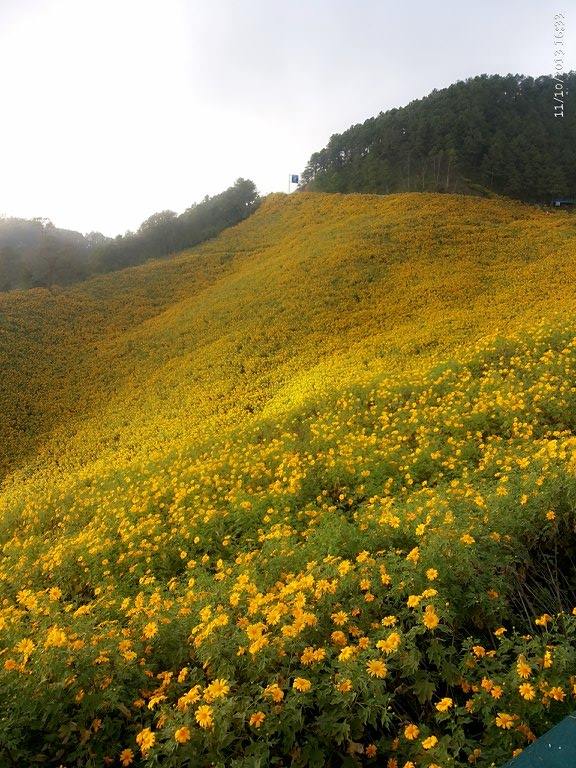
If local Thai call this the hot season, it can be melting hot for foreigners. Expect temperatures generally above 30°C, barely sinking at night and reaching well above ‘sweat levels’ in the day time. What's remarkable is that in only 3 months, Chiang Mai moves from its coldest period to its hottest.
During much of this season, there isn’t much rain and there aren’t that many clouds, so it’s mainly hot and hot. If you like or can stand high temperatures, it’s not a problem.
What does create a problem is air pollution. Starting from the end of February until mid April (Songkran), traditional slash-and-burn techniques in rice agriculture cause major air pollution all over the North of Thailand. These burning practises are conducted all over the North of Thailand and the neighbouring countries and, despite government propaganda to combat it, no real measures are taken and every year the same thing happens.
Foreigners call this period from the end of February until Songkran also the ‘burning season’ or the ‘smoky season’. You can follow the seriousness of air pollution on a government monitoring site. The most damaging to health are the fine particles, summarised by the indicator PM10 (particles smaller than 10 mol).
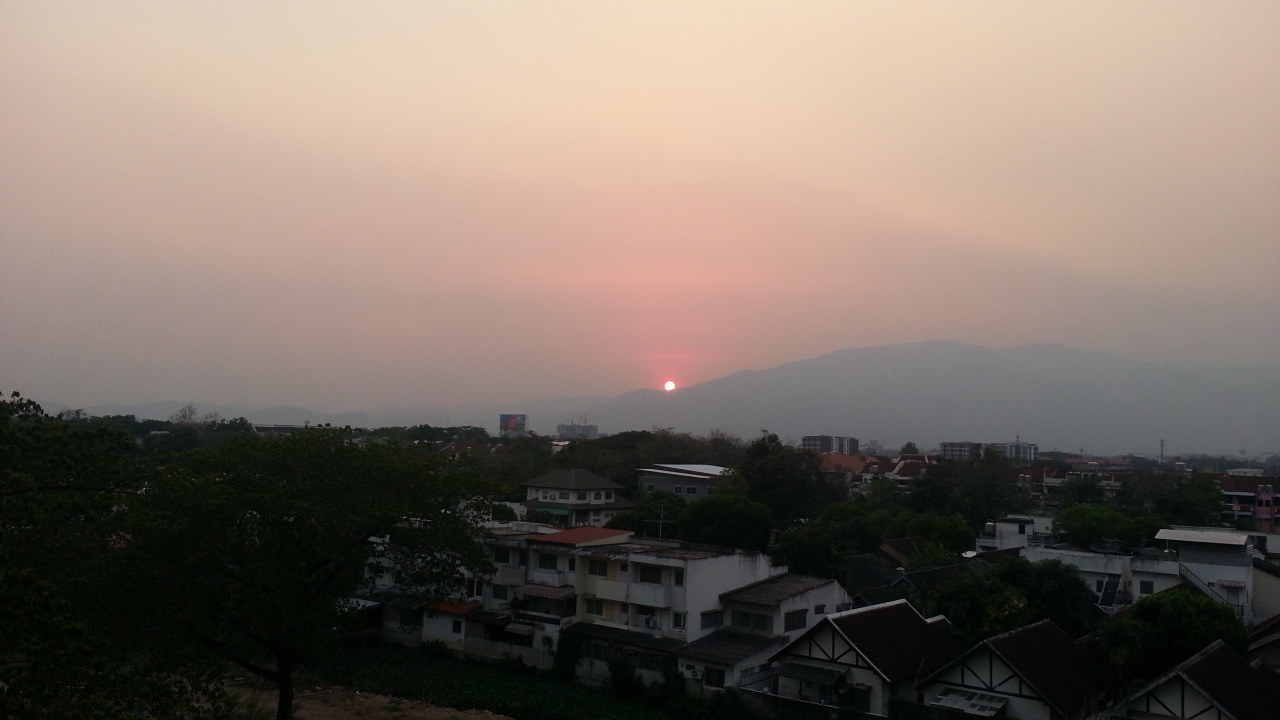
Despite much criticism amongst others from foreigners and government propaganda, haze pollution in Chiang Mai has only gotten worse during the past decades and, although there are practical and technical sollutions, changing the Thai mindset is the hardest challenge. Pollution is therefore to stay in Chiang Mai and the North of Thailand for many years to come.
If you choose Chiang Mai as your long term home base, you not only have to plan visa runs to keep your papers in order, but also pollution runs in March and April when the pollution reaches levels you can't stand (for example an AQI of more than 200 for weeks on end).
An interesting documentary about smoke pollution in the North of Thailand by Marisa Marchitelli.
The burning season practically ends around Songkran, the Thai Year and the Water Festival, which welcomes the coming of rain that helps to sweep the air clean.
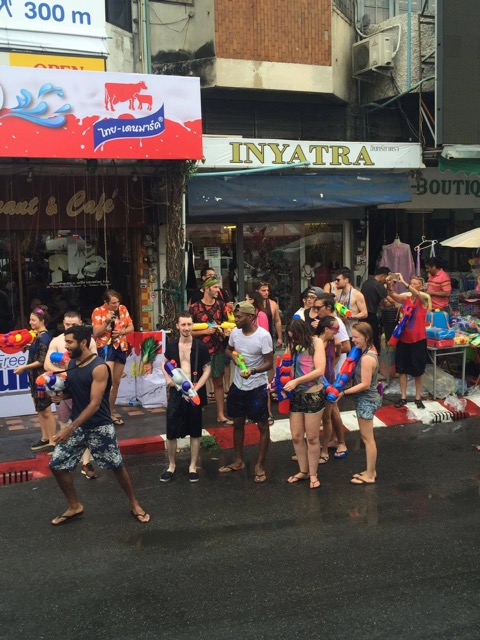
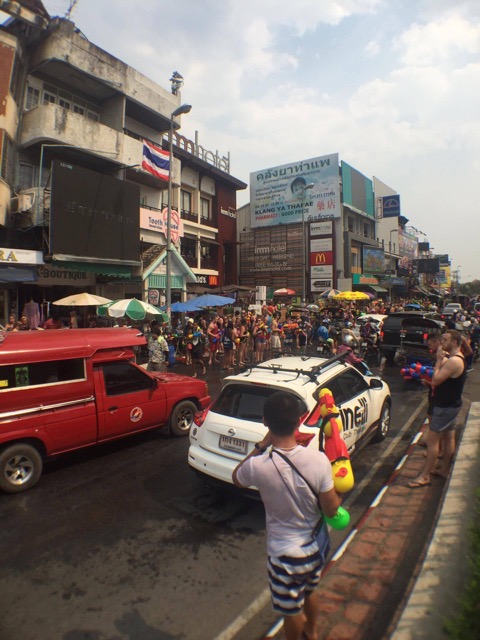
While temperatures are still high, but not as high as in the Hot Season, this period is characterised by regular, heavy rain showers. The sky is often covered by clouds, making it less hot than the Hot Season, and there can be some wind and rain once or twice a day or once every few days.
At times, the wind can be very strong, almost like wind storms, and the rain usually doesn’t come as a drizzling rain that lasts all through the day, like in Northwest Europe for example, but strong concentrated rain showers often at the end of the day.
This makes the Rainy Season a period one can deal with, you just need to take a rain coat with you in case of rain or wait for a while. It’s not like in Northwest Europe where cold, grey and rainy days can keep you depressed and in the house for days.
The changing skies make this one of the most beautiful periods in Chiang Mai, as the wind and rain make the air crystal clear and you can suddenly see all of the surrounding mountains that in other periods you may not see due to the everlasting smog. Ever-changing cloud formations create fantastic views on the mountain Doi Suthep and you can see more detail on the mountain than in any other period. Nature is more green in this period.
The downside about this period is the high humidity level in the air, so clothes can stay damp after washing for a while and people with a sensitive skin may experience some discomfort. Fungi grow extremely well in this period and even dogs and horses tend to have some skin problems then.
Another discomfort in this period is that there are more mosquitos, because the rain creates more places for them to breed. There are mosquitos all year round of course in Chiang Mai, but in this period particularly more. This sometimes leads to an outbreak of dengue.
In the tourist industry, much of the Rainy Season is low season.
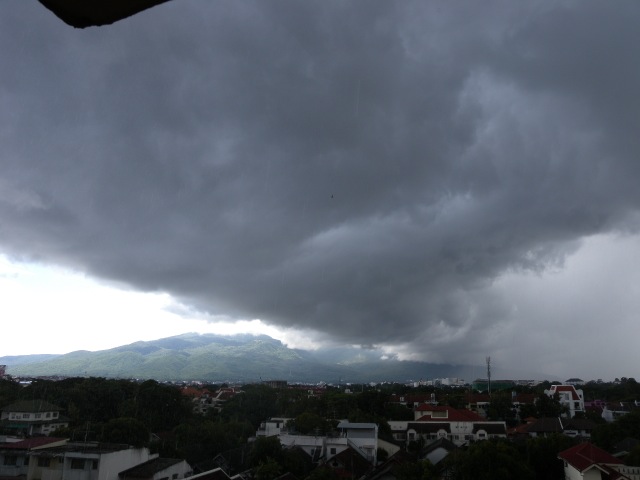
Dark clouds over the city but the sky will be fresh and clear after that
What is the best period to visit or stay in Chiang Mai really depends on your daily activities and preferences.
Clearly, if your home is in a cold and rainy Western European country, your preference is likely to be for hot, sunny and dry weather. Most guidebooks for this reason recommend the Cold Season.
Local Thai and long-term residents of Chiang Mai tend to have a preference for cooler weather, avoid being too much in the sun, and know that air quality is an important factor determining the quality of life in and around the city.
Sunlight isn’t a scare good in Thailand so in all periods there’s plenty of it and the sunlight in fact is so strong that it’s really better for your skin not to be overexposed to it on the long term.
The air quality in Chiang Mai is normally affected by the poor quality of fuels used in vehicles (watch the black smoke coming out of old cars), that creates an ever-lasting smog around the city unless wind and rain sweep the air clean. Wherever you live in the city, you’ll notice that within a few days a fine dust sediment has sank into your apartment, that can easily cleaned but that’s in the air nevertheless.
When you live closer to main roads, in addition to fine dust, there are sticky fuel particles that tend to attach to certain surfaces, and you can notice this after a few weeks for example on the blades of your fan.
In other words, there is a “natural” level of air pollution in the city that exists through all seasons, but that can be alleviated due to rain and wind and gets more pronounced during long period of drought.
Activities:
If you plan to drive around on a motorcycle in the country side and mountains, the Cold Season could be good, because the roads are dry and in nature you will have less city dust.
If you plan to stay long-term and you’re looking for cheaper rates, the Rainy Season offers great deals.
If you’re not so sensitive about dust and air pollution, the Hot Season is nice and hot.
Generally, the South recognises only 2 seasons:
I. the Hot Season - roughly from November to June
II. the Rainy Season - roughly from June to October
Be aware that it’s always much hotter than in Chiang Mai and besides heavy rain, the effects of typhoons are more pronounced in the South.
©2025 chiangmailocator.com. All rights reserved. Powered by annuaire SEO.